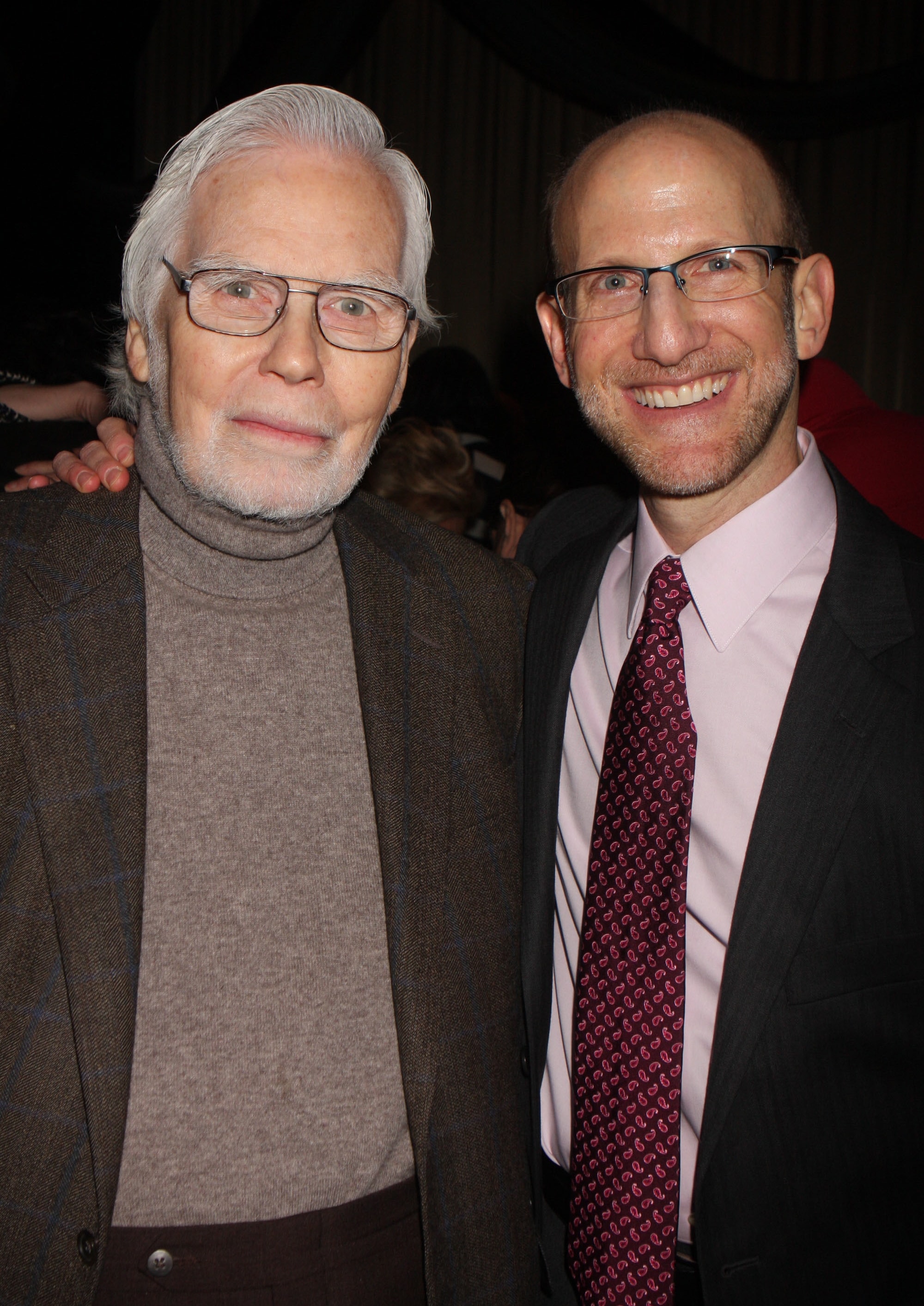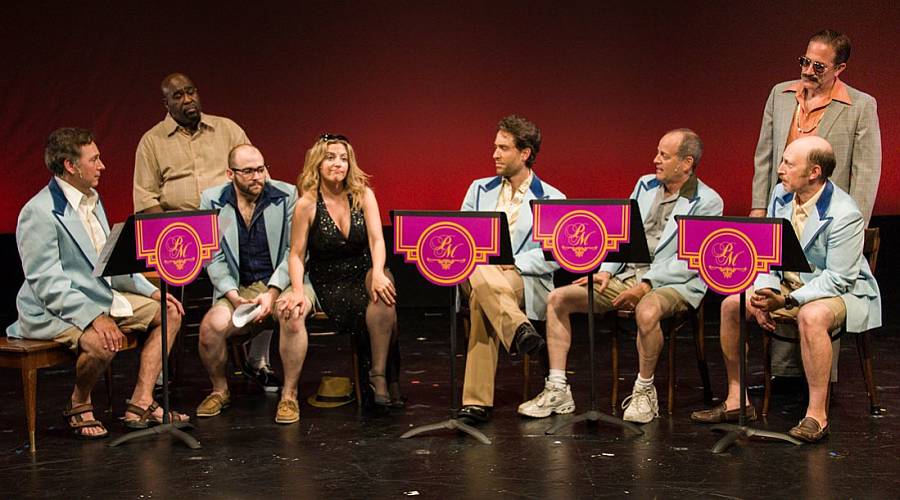Frank Gilroy was my collaborator, my teacher, my inspiration, my friend. We first met some time in 1991, although I suspect Frank noted the exact date in his journal, his daily regimen. I had watched his film The Gig on VHS after American Film magazine listed it as one of the top 10 jazz films. Having enjoyed a few gigs as a 16-year-old pianist/vocalist on Cape Cod, I was eager to explore this fertile territory in a musical. I was convinced a vehicle focusing on a sextet of 9-to-5 guys living their midlife dream as amateur jazz musicians could sing, but could I convince Frank?
We were both represented by William Morris. We also shared a relationship with William Goldman—Frank was a longtime friend of Bill’s, while I had adapted his novel No Way to Treat a Lady as a musical. So far so good.
Frank stepped off the William Morris elevator and greeted me in a warm, convivial manner. He was a tall, imposing man who was fortunate to have all his hair (mine was already thinning). We met in the empty office of an agent who once represented Billie Holiday (another fortuitous sign).
After some pleasantries, Frank got down to business. “I’m flattered you’re interested in making a musical of The Gig, but tell me, why would someone so young be interested in working on a show about middle-aged men?”
My reply: “Well, musicals take so long that I’ll probably be middle-aged by the time this show is produced.” Those words turned out to be strangely prophetic, although all I knew at the time was: Frank laughed, the ice was broken, and a friendship began.

The truth is, I felt compelled to adapt The Gig. About 10 minutes into the film, Georgie, a deli owner who plays bass and is facing potentially life-threatening surgery, rebukes his compatriots for not seizing the chance to grab their only bona fide gig. “You guys are a bunch of class-A schmucks,” Georgie says. “I mean, take it from a charter member who, like most of you, has spent his life doing for other people…When was the last time you did something you really wanted?” That scene not only resonated but also haunted me. Frank concurred that it was the heart of the piece and proposed a two-page agreement, as he disliked long contracts.
Frank was incredibly generous with his time during the creation of The Gig, inviting me to the beautiful home he shared with his wife, Ruth, who was Frank’s equal in every way. She prepared a delicious lunch including her celebrated three-bean salad. I played songs for them, and he would comment, letting me know when I was on target or “fuzzy.” (Ruth, who has her own definite opinions, didn’t always concur.) Through this visit, subsequent meetings, and phone chats, I also learned quite a lot about Frank the person. He based The Gig on his one foray, right out of college, as a professional trumpet player, which led to a valuable discovery. “Found out I would have been third-rate at best,” he said. “I also found out a professional is someone who does his job even when he doesn’t feel like it. And I was not a professional.”
But as a playwright, he defined the word. He wrote every day, not just contributing to his journal, but writing plays, screenplays, novels, ideas, fragments of ideas. His family told me he was dictating from his bed toward the end. “The pure art of writing sustains you if you enjoy the process,” he shared with me.
He also shared glimpses of his momentous life, which fueled his writing, having bravely served in the army during the last two-and-a-half years of World War II under Patton (whom he never met). He liberated the first concentration camp, Ohrdruf (a sub-camp of Buchenwald), and wrote his powerful Drama Desk–nominated play Contact With the Enemy as a response to the atrocities he witnessed firsthand. Like many of Frank’s plays, it has not received the attention it deserves. But attention must be paid.
Frank’s work was often deceptively spare, but that’s what made it all the more powerful. He left something to the imagination. He trusted his audience to instinctively know how to make the emotional and intellectual connection.
Whenever Frank met with disappointment in his career—and he was not immune—he invoked the names of three fallen comrades from his infantry who never returned home. He persuaded me not to be disheartened by criticism, although he knew “we’re very quick to agree with the lesser estimates.” He also gave me perhaps the best advice I’ve received in the theatre: “You can control the effort, not the results. All you can do is all you can do, but make sure that’s all you can do.”
Frank saw The Gig in nine different incarnations over the course of 20 years, including readings at the O’Neill and MTC, productions at Goodspeed and Lyric Stage of Boston, and a concert at the York Theatre, which was professionally recorded. In the summer of 2014, he made the challenging trek to New York to speak at the New York Musical Theatre Festival press launch, as it marked the very first time The Gig was enjoying a full production in New York. (My quip to Frank in our first meeting turned out to be prophetic.) Although we had spoken many times over the recent months, I wasn’t prepared to see how he’d aged. This time, his cane wasn’t just “an affectation” but a necessary means of support. Still, he bounded into the theatre with the same exuberance as when he first greeted me stepping off the William Morris elevator.

Hedwig’s Lena Hall introduced Frank following The Gig’s number “Farewell Mere Existence, Hello Jazz!” He began by congratulating her on her Tony victory, briefly reminisced about his early experience as a trumpet player, and then offered one piece of advice:
“For those starting careers, you’re going to have an experience where you do very good work with people, and you end up being enemies. You’re also going to have an experience where you do very bad work with people; they end up being your lifelong friends. And then, once in a very great while, you get a chance to do good work and stay friends with the people. That’s my experience with Doug Cohen…I hope you share that experience.”
He sat down and, with a gleam in his eye, asked, “How was that?”
“That was great, Frank,” I said, my hand squeezing his shoulder as I fought back tears. “Just great.”
Douglas J. Cohen is a composer, lyricist, and vocal coach based in New York City.

